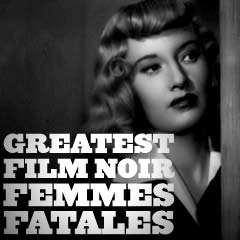
|
|
(chronological by film title) Introduction | Picture Guide | 1941 | 1944 | 1945 | 1946-1 | 1946-2 | 1947-1 | 1947-2 1948 | 1949 | 1950-1952 | 1953 | 1954-1956 | 1957-1959 |
|
|
|
|||||||||||||||||||||||||||
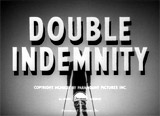
|
Double Indemnity (1944)
Mostly told in flashback, Billy Wilder's (and Raymond Chandler's) adaptation of James M. Cain's 1943 crime novel included a persuasive, sinister brassy blonde - a beautiful, shrewd, predatory and dissatisfied femme fatale housewife named Phyllis Dietrichson (Barbara Stanwyck). The narrated flashback was delivered (mostly into a Dictaphone recording device) by the wounded, male protagonist, insurance salesman Walter Neff (Fred MacMurray) in his downtown Los Angeles office late one night, after he had been shot by her (and had retaliated by killing her with two point-blank gunblasts). Would he survive before an ambulance arrived, or would his wish for death (either from blood loss or from the San Quentin gas chamber) come true? In the early stages of the film, Phyllis first appeared draped in a towel during sunbathing when smart-talking agent Walter Neff came to her door. She enticed Neff with her blonde bangs and gold anklet. Her entrance was stunning. The cool blonde-wigged Phyllis - first in a towel as she emerged at the top of a stairs landing in her Glendale, California home, looked down and was wearing only a bath towel on account of being interrupted while sunbathing - she asked bewitchingly of Walter Neff standing below her: "Is there anything I can do?"; she noted that she wasn't "fully covered"; taking her in lustfully, he slyly joked about the Dietrichsons' insurance "coverage."
Soon after she dressed, the camera focused on her legs (from Neff's point-of-view as he observed her) where she wore an engraved, gold ankle strap on her left ankle, flashing it at him as she came down the stairs. He also watched her exhibitionism as she finished buttoning up her blouse and put on her lipstick. In a classic sequence filled with sexual innuendo, they playfully and flirtatiously engaged in a double-entendre conversation about "speeding" and "traffic tickets" - a driving/fast car metaphor. She rebuffed him: "There's a speed limit in this state, Mr. Neff, 45 miles an hour" - she claimed he was going 90 mph. He was immediately entranced and attracted to her, but even early on, he understood her lethal, strangely-calculating look and smell:
During their subsequent business conversations, she described her older, boring husband's (Tom Powers) dangerous profession with the drilling crews in the Long Beach oil fields. And she complained about her loveless, emotionless marriage:
Obviously an experienced predator and knowing of Neff's undisguised lustful interest in her, she inquired about buying an accident insurance policy for her husband - without him knowing about it, "without bothering him at all...he needn't know anything about it." At first, Neff was suspicious of her motives ("Look, baby. You can't get away with it. You want to knock him off, don't ya?...Boy, what a dope you must think I am!") and thought he was clever to reject her: "So I let her have it, straight between the eyes. She didn't fool me for a minute, not this time. I knew I had ahold of a red hot poker, and the time to drop it was before it burned my hand off." But then like a moth to a flame/light, he was still allured to her: "I was all twisted up inside and I was still holding on to that red-hot poker. And right then it came over me that I hadn't walked out on anything at all, that the hope was too strong, that this wasn't the end between her and me. It was only the beginning." She appeared at the door of Neff's darkly-lit apartment doorway, on the pretense of returning his hat from earlier that afternoon, although her real intent was to entice him into a dangerous affair. She peeled off her coat, and was revealed to be wearing a very tight, form-fitting white sweater designed to excite him. By the wet window pane, Phyllis reiterated more about the suffocating relationship she had in her marriage. She told how she was trapped like a caged animal in a loveless marriage to her domineering and mean husband Dietrichson (in his second marriage): "I feel as if he was watching me. Not that he cares, not anymore. But he keeps me on a leash so tight I can't breathe." But as she drifted away from Neff to leave, he grabbed her by the wrist and kissed her, feverishly telling her:
Back in the living room with their drinks, Phyllis again explained about being trapped in a loveless marriage to her domineering and mean husband Dietrichson. She was unable to convince the hateful Mr. Dietrichson to grant her a divorce. She married him out of pity after the death of his first wife (who was sick for a long time), when she served as the wife's nurse. Phyllis imagined killing her husband in an enclosed garage by carbon monoxide poisoning. Phyllis cried about her predicament as he held her on the sofa. He put his arms around her and told her: "And I don't want you to hang, baby. Stop thinking about it, will ya?" But Neff admitted that he was taken by her teary-eyed seductiveness, in a flash-forward. The scene tracked/dissolved back to Walter's apartment, the same evening, where Neff reclined on the sofa smoking a cigarette, and Phyllis was fixing her makeup - presumably after they had sex. She expressed her disdain about returning to her husband. Neff had already decided to join her in scheming to kill her husband and help her make it look like an accident - to collect on her husband's accident insurance policy:
He told her that they were going to do it with a brilliant, scheming plot. A kiss (and more during a dissolve) sealed the murderous pact between them. He grabbed her tightly and dug his fingers into her arm. Neff expressed himself with a fierce determination in his voice, vowing that everything must be perfection "straight down the line."
As she went out the door, she repeated his words: "Straight down the line." Ultimately, she had convinced Neff to murder her unsuspecting, boring husband (and make it look like an accident) so they could share 'double indemnity' accident insurance proceeds. They continued to meet surreptitiously, often talking over shelves stocked with groceries, to cooly discuss the complicated details of the planned murder and wait for the right set of circumstances to arise. The murder occurred as Phyllis drove her husband to the train station - Neff reached from behind and killed Mr. Dietrichson by breaking his neck. A camera close-up of Phyllis's unmoving and stony face staring straight ahead was all that was revealed during the murder that was brutally carried out on the seat next to her. The final scene - a deadly double-cross scene, occurred between the two plotters and conspirators in the darkened Dietrichson living room where Phyllis sat awaiting Neff. When he arrived, she admitted that they were both rotten:
Neff had intentions to kill Phyllis, but she upstaged him with 'plans of her own.' As he closed the window, she pulled out a concealed, shiny, metallic gun - Phyllis shot Neff once in the shoulder and he taunted her to finish him off with another shot: ("You can do better than that, can't ya, baby? Better try again. Maybe if I came a little closer? How's this? Think you can do it now?"), but she lowered her gun and hesitated to kill him for some reason (because of her love for him, or because of her conscience?). He took her gun away, and she admitted her rottenness again: "I'm rotten to the heart. I used you just as you said." But he didn't "buy" her act; then during a final erotic embrace after she asked to be held close and she surrendered to him in his arms, she drew slightly back in surprise and fear, realizing that it was her final moment when she sensed the barrel of his gun against her chest; Walter grimly shot her with two point-blank gunshots into her chest ("Goodbye, baby") She asked him to hold her close - and when she surrendered in his arms in a final erotic embrace, she drew slightly back in surprise and fear, realizing that it was her final moment when she sensed the barrel of his gun against her chest. Cold-heartedly, he coldly told her: "Good-bye baby." Walter grimly shot her twice at point-blank range - during their erotic embrace. |
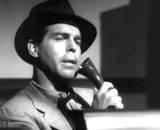 The Confession by Walter Neff - Flashback 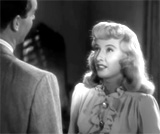 First Meeting - Sexual Banter in Her LIving Room 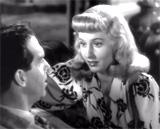 Second Meeting - The Purchase of Insurance For Her Husband (Without His Knowledge) 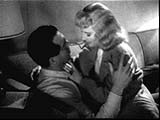 The Start of a Dangerous Affair 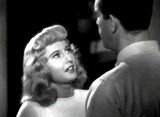 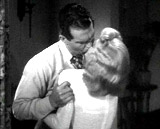 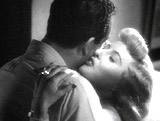 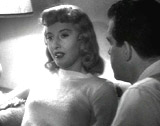 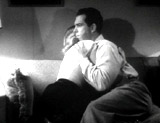 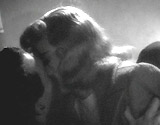 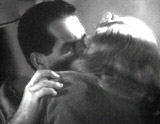 Kissing in Neff's Apartment  Surreptitious and Furtive Meetings 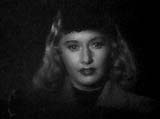 Cold-Hearted Stare During The Murder of Her Husband 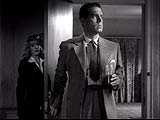
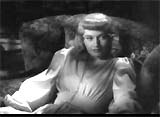 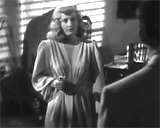 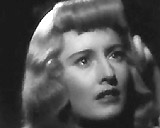 
Final Erotic Encounter and Embrace - Neff: "Good-bye Baby." |
||||||||||||||||||||||||||
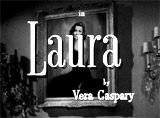
|
Laura
(1944)
Preminger's hard-edged noir romance might be called a psychological study of deviant, kinky obsession, because almost everyone in the cast loved the title character Laura, who was not a classically amoral femme fatale. The memorable opening scene featured a pan around the interior of a New York penthouse and the occupant's narration, delivered in voice-over by celebrated, acidic-witted, homosexual columnist Waldo Lydecker (Clifton Webb):
While investigating socialite Laura Hunt's (Gene Tierney) murder, obsessed homicide police detective Mark McPherson (Dana Andrews) rummaged through Laura's bedroom drawers and lingerie, inhaled her perfume, and peered into her mirrored closets and then stared at her haunting, domineering oil portrait - and fell in love with the dead woman in the portrait. In fact, at the beginning of the investigation inside of Laura's Manhattan apartment by Lydecker and McPherson, both stared at Laura's portrait above the fireplace. The film contained troubling necrophiliac themes and sexual obsession by the hard-boiled detective for the dead woman. Laura's loyal "domestic" maid Bessie Clary (Dorothy Adams) castigated McPherson for reading Laura's private letters and diary: ("You've been readin' 'em, pawin' over them. It's a shame in the face of the dead. That's what it is. It's a shame!"). She also stated her adoration for Laura: ("She was a real, fine lady..."). Columnist Waldo Lydecker also incisively described McPherson's obsession over the murdered bewitching woman ("...It's a wonder you don't come here like a suitor with roses and a box of candy...I don't think I ever had a patient who ever fell in love with a corpse"). Lydecker had functioned as Laura's Svengali-like mentor and protective confidant in a platonic relationship, when he helped her become a successful advertising executive. Womanizing, effete Southern playboy Shelby Carpenter (Vincent Price), whose marriage to Laura was recently called off, was also a prime suspect (he confessed later to being present at the murder scene when the off-screen shooting occurred). In a surprising and memorable scene, Laura Hunt suddenly walked into her own apartment - a murdered woman who mysteriously appeared over half way into the film - there were double-stunned looks. Laura was shocked to find a stranger in her apartment, and likewise, Detective McPherson had an astonished look when stirred from sleep as the "dead" Laura appeared. At first, he thought she was a ghost or figment of his imagination. He had already dreamed of what she was like from her portrait, her perfume, her clothes, her letters, her apartment's decor, and the recollections of others. He probably wondered if he had willed her into existence. Also later, Lydecker expressed a stumbling reaction to seeing Laura alive. She threatened to call the police: "What are you doing here?" - unaware of the news of her own slaying. Laura was horrified to realize that she was caught in the middle of a murder case. The murder victim was actually a young model named Diane Redfern in her negligee, in a case of mistaken identity. After reappearing, Laura herself became a prime suspect in the murder case, since it was possible that Laura killed Diane Redfern out of jealousy for her association with Shelby. Another suspect was Anne Treadwell (Judith Anderson), Laura's wealthy, amoral spinster aunt who was neurotically in love with Shelby and decidedly defensive and jealous of the younger Laura, her engagement, and her possible forthcoming marriage to Carpenter. There was a tough interrogation scene in which McPherson grilled Laura about what she had been holding back: ("Let's have it"). In the film's conclusion, Lydecker was delivering a radio broadcast ("I close this evening's broadcast with some favorite lines...Brief Life - They are not long, the weeping and the laughter, love and desire and hate. I think they have no portion in us after we pass the gate...They are not long, the days of wine and roses. Out of a misty dream, our path emerges for a while, then closes within a dream"). Lydecker threatened to kill Laura with a shotgun blast rather than lose her to McPherson: ("The best part of myself - that's what you are. Do you think I'm going to leave it to the vulgar pawing of a second-rate detective who thinks you're a dame? Do you think I could bear the thought of him holding you in his arms, kissing you, loving you? There he is now. He'll find us together, Laura as we always have been and we always should be, as we always will be"). It was revealed that Lydecker was the actual murderer, who in a jealous rage mistakenly shot the wrong woman (in the face) with a blast from a shotgun, thinking Diane was Laura. Now, he was attempting to kill Laura a second time with a shotgun (hidden in the base of a grandfather clock) during a murder/suicide -- but she was saved in the nick of time by McPherson as Lydecker was mortally wounded in an exchange of gunfire with the police. Lydecker delivered his last words to Laura when she rushed to his side: "Good-bye, Laura. Good-bye, my love," accompanied by an image of the shotgun-damaged grandfather clock.
|
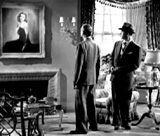 Lydecker and McPherson Staring at the Portrait  Laura's Haunting Portrait - Stared At by Detective McPherson  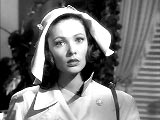 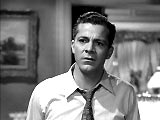 Laura's Sudden Appearance to Detective McPherson 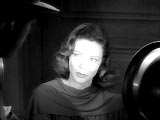 Laura's Harsh Interrogation Scene  The Shotgun-Damaged Grandfather Clock Where the Gun Had Been Hidden |
||||||||||||||||||||||||||
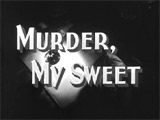
|
Murder, My Sweet (1944)
Edward Dmytryk's twisting story of intrigue was a superb, complex, shadowy film noir about murder, corruption, deception, blackmail, bribery, double-cross and double identity, with witty dialogue and cynical, descriptive voice-over narration. It was noted for its expressionistic, shadowy chiaroscuro lighting, strange camera angles, and frequent first-person, descriptive and very memorable voice-over narration. There were basically three separate narratives that were neatly woven together in wartime Los Angeles: a search for a love-sick ex-con's missing ex-lady friend from 8 years earlier, a search for the femme fatale's 'stolen' jade necklace (the film's MacGuffin) worth $100,000 around which much of the action occurred, and the transformation of a cheap showgirl into a wealthy, gold-digging, promiscuous trophy wife. The opening shot was of a blinding ceiling light and sounds of accusatory voices, and then a pull-back camera to the side of detective Philip Marlowe (Dick Powell), with bandaged eyes as he was interrogated by police and then began to relate his tale - in flashback. The tough yet vulnerable, blindfolded/bandaged gumshoe detective was being grilled about a few murders that involved his gun; in flashback (almost the entire film), he told a disorienting and bewildering tale about how he was temporarily blinded. He described how a brooding figure had appeared in his office window-pane (flashing city lights reflected onto the face of brutish Moose Malloy (Mike Mazurki) standing behind him in the darkness). Malloy was the love-struck ex-con who hired Marlowe to look for a mysterious Velma Valento. The two visited Florian's, a seedy, upstairs nightclub in downtown LA where Velma used to sing, and Marlowe traced down alcoholic and widowed Jessie Florian (Esther Howard) who claimed Velma was dead. After he left, he watched through her outside window as she secretly made a phone call [Note: The call was to tip off Velma's alias. Also, it was highly probable that another call was made by "Velma" or by Jessie to an LA con-man later identified as Marriott.] The next morning, it wasn't a coincidence that perfumed, effeminate 30-ish gigolo Lindsay Marriott (Douglas Walton), an LA resident or con-man, showed up in Marlowe's office; in a seemingly-unrelated case to Moose's search for an elusive girlfriend, Marlowe was commissioned as a bodyguard, for $100, to accompany Marriott to a secluded canyon during a late-night (midnight) ransom payoff of $8,000 in cash for allegedly stolen jewels (a jade necklace), for a lady friend of his. During the altercation later that night, Marlowe was knocked unconscious with a blackjack: ("I caught the blackjack right behind my ear. A black pool opened up at my feet. I dived in. It had no bottom. I felt pretty good... like an amputated leg"); [Note: By this time, Marriott had already been killed and his body was stuffed into the car]; when Marlowe regained consciousness, a young woman blinded him in the face with a bright flashlight and asked: "Are you alright? What happened? Oh!" before running off; afterwards, Marriott was found bludgeoned to death with the same weapon and stuffed into the front seat of the car. Marlowe was questioned by authorities, and was warned that the real kingpin of the jewel heist mob was aristocratic master-crook and blackmailer Jules Amthor (Otto Kruger), a shady underworld figure who was being closely investigated for his involvement in setting up rich women with valuable jewelry as targets; he had probably been aligned with Marriott. Marlowe also encountered Ann Grayle (Anne Shirley in her final film) and suspected that (1) she knew the owner of the jade necklace, or (2) she might have been involved in Marriott's murder. She was definitely trying to protect her beloved, cuckolded, and helpless father Mr. Grayle, who had married her wicked step-mother Mrs. Helen Grayle: ("The jade belongs to my father...My father happens to be married...She's not my mother!"). The two visited the Grayle mansion in Brentwood where he met elderly Mr. Grayle (Miles Mander) and his much younger trophy wife and femme fatale vamp Helen (Claire Trevor), a gold-digger (with a double identity) who was prominently showing off her legs and ankle-strap high heels. The mysterious, flirtatious and slinky Helen Grayle admitted that she frequently dallied with Marriott and other "pretty guys," and that Marriott was pals with sinister "bad-boy" Amthor, an aristocratic master-crook, and underworld blackmailer whom she described as a psychic quasi-therapist. [Note: Her story was that Amthor was blackmailing her with his knowledge of her criminal past, her infidelities with Marriott, and for her criminal associations with others, although it was fairly obvious that she was also one of his lovers.] Mrs. Grayle hired the detective to locate a stolen $100,000 jade necklace. Shortly later, Helen briefly flirted with Marlowe in his apartment and at the Cocoanut Beach Club.
Marlowe continued to navigate through a perilous world, becoming further entangled with and threatened by despicable high- and low-class criminals. During a struggle with master-crook Amthor in his fancy high-rise Hollywood penthouse apartment, Marlowe was struck in the face with the butt of Amthor's gun. For three days, while suffering drug-induced hallucinations and nightmares, Marlowe was imprisoned in a sanitarium under the watch of white-coated Dr. Sonderborg (Ralf Harolde) with a giant hypodermic needle. After breaking out, Marlowe was still the prime suspect for Marriott's murder (and the theft of the necklace) while continuing to conduct his own investigation; Marlowe knew that the jewelry Marriott was supposed to be buying back was a jade necklace belonging to one of Amphor's unnamed patients, worth about $100,000 dollars. Although Marlowe's two cases were confusing, they were both linked by one person - Velma and Mrs. Grayle (the same individual) who had set up numerous individuals over the alleged theft of her jade jewelry; she was indeed a murderous and promiscuous femme fatale. [Note: offscreen, Moose had demanded that Amthor stop "kidding" and had forced him to divulge Velma's whereabouts - and had accidentally killed him.]
In the first of two scenes set at the Grayles' beach house, Ann revealed her ambivalent feelings toward Marlowe - and they kissed. After Ann left, Helen also attempted to seduce Marlowe and described her problems with Amthor; she accused Amthor of bribery or blackmail, after he had learned of her promiscuity and infidelities with Marriott; she admitted that to keep him quiet, she had promised Amthor the necklace as 'hush money,' but then the necklace was stolen; she accused Amthor of murdering Marriott in the canyon for plotting to steal the necklace; and then, she proposed that Marlowe assist her in killing Amthor: ("I want you to help me kill Amthor"); she threw herself at Marlowe and offered herself for a kiss ("I need you") and he succumbed. After leaving the beach house, Marlowe entered Amthor's ransacked penthouse, and found that Amthor had a snapped neck - the murder was assumed to have been committed by the brutish Moose Malloy "with a big pair of hands." During a second and final confrontation in the Grayles' beach house, Mrs. Helen Grayle/Velma Valento showed the astonished Marlowe the jade necklace (the film's MacGuffin), and admitted that she had fabricated the entire robbery: (Marlowe: "It was never stolen? There wasn't any holdup? You faked the whole thing"); Marlowe didn't buy her explanation that Amthor was to blame for Marriott's murder in the canyon; he accused her of getting rid of Marriott as a murderous femme fatale; in fact, her plan was to set up both Marriott and Marlowe (a "nosy detective" interfering in her schemes) to be killed in the canyon (Marlowe: "I almost ended up as dead as Marriott"); but her pretty, red-haired stepdaughter Ann Grayle had arrived at an inopportune moment, and she was only able to murder Marriott; Marlowe also surmised that eight years earlier, Helen (in her double identity as Velma) had charmed Moose into committing a homicidal crime that had sent him to prison; he challenged her that she couldn't fool him like she had fooled Moose 8 years earlier: "It won't work twice."
As Marlowe was about to be shot dead by Helen, Ann and her jealous, love-sick millionaire husband entered; Mr. Grayle was ordered to take Marlowe's gun from his inside pocket; after Mr. Grayle heard Marlowe state that Moose's infatuation with his unfaithful wife Helen had led to Amthor's death, he jealously shot his wife dead (with Marlowe's gun); love-struck ex-con Moose Malloy heard the shot from outside and rushed inside, where he reacted to Helen's lifeless body on the sofa: "She ain't hardly changed... just like always, only more fancy. Cute as lace pants...always..."; Mr. Grayle angrily reached for the gun a second time to protect himself from a retaliatory Moose and shot him dead; Marlowe's eyes were temporarily scorched and blinded by the gun blast when he attempted to intercede; they struggled for the gun and two more gunshots were heard off-screen - they both died from lethal gunfire.
In the film's ending back in the present after the temporarily-blinded Marlowe's tale ended during his interrogation, he was cleared of all charges. He was reunited with cute love interest Ann in the back of a taxi-cab, knowing it was her due to her perfume; she accompanied him home as they shared a kiss. |
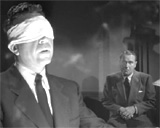 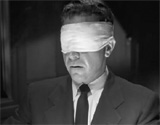 PI Detective Philip Marlowe (Dick Powell) Bandaged and Interrogated in Police Station 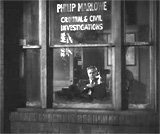 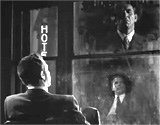 Start of Flashback: Moose Malloy in Marlowe's Office 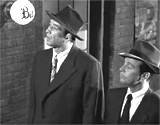 Malloy and Marlowe Outside Florian's Bar 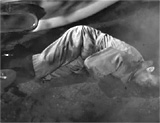 Marlowe Knocked Out Unconscious And Marriott Was Killed in Canyon 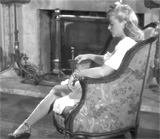 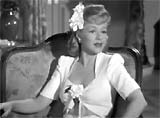 Femme Fatale Mrs. Helen Grayle (Claire Trevor) 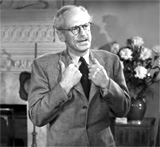 Mr. Leuwen Grayle (Miles Mander) 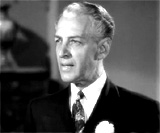 Jules Amthor (Otto Kruger) 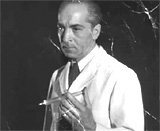 Marlowe's Nightmarish Hallucinations of Pursuit by Quack Doctor Sonderborg (Ralf Harolde) 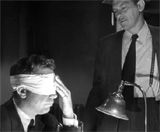 End of Flashback: Marlowe Back in the Interrogation Room 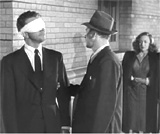 Exiting the Police Station, With Ann Silently Following Behind 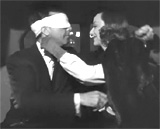 Perfume-Wearing Ann Grayle and Marlowe Kissing in Back Seat of Taxi |
||||||||||||||||||||||||||
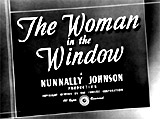
|
The Woman in the Window (1944)
This tense film noir - director Fritz Lang's dark noir masterpiece - featured a very detailed tagline:
Professor Richard Wanley (Edward G. Robinson), a mild-mannered, law-abiding, middle-aged and married criminal psychology (Assistant Professor) at Gotham College, was soon to become enamoured by the requisite femme fatale - the film's main character. While his family was away on vacation, he met beautiful, strange painting model and femme fatale Alice Reed (Joan Bennett) - when she emerged as a reflection next to a painting in an art gallery window. He risked his entire future after meeting up with her. Invited back to her mirrored apartment where she was wearing a diaphanous dress, they sipped champagne and talked. Then, at 1 am, a taxi pulled up, and Alice's hot-tempered and jealous boyfriend "Frank Howard" (Arthur Loft) abruptly arrived. (Later, he was revealed to be a wealthy and prominent Wall Street financier/businessman of World Enterprises Inc. named Claude Mazard, with initials CM.) He immediately slapped Alice after accusing her of infidelity - and had misinterpreted Wanley's presence. He fist-punched the Professor and began choking him on the sofa. With a pair of scissors handed to him by Alice, Wanley stabbed "Howard" to death in the back. The conservative Professor had become embroiled in a crime due to his unintentional self-defense murder of an assailant. Wanley suddenly found himself on the run when he and Alice decided to avoid contacting the police, and instead opted to put the body in his car's back seat (rolled into a blanket) and dump it far away in the country. During the cover-up, Wanley left a trail of clues (a muddy tire track) and other witness sightings (the garage attendant, a policeman, Alice's upstairs neighbor, a toll booth collector, etc.). Alice planned to thoroughly clean her apartment, and discard the dead man's personal belongings (including his monogrammed CM pocketwatch) into the river the next day. The headlines from the New York paper read: "MAZARD MURDERED: Body Discovered by Boy Scout in Suburban Woods." There were tense scenes when Wanley listened as his friend District Attorney Frank Lalor (Raymond Massey) took the case and began to discuss his findings - and Wanley became increasingly-desperate, paranoid, and tense during a visit to the crime scene with Lalor. He worried that there was evidence of a scratch on his right hand from barbed wire and a case of poison ivy acquired while he was dumping the corpse in the woods. Alice (and Wanley) were soon marked as the killers and blackmailed by Mazard's sleazy bodyguard Heidt (Dan Duryea), nicknamed "Pappy," a wanted ex-cop and "known crook with a blackmailing record." Alice's attempt to be cooperative with Heidt, pay him off, and poison him failed. Realizing that he had been double-crossed, Heidt proposed an even heftier blackmail sum from Alice of $5,000 more dollars.
However, as he left Alice's apartment, Heidt was shot to death in a gun battle with police (he was assumed to be the financier's murderer after the incriminating "CM" pocketwatch and Alice's $5,000 in cash were found in his pocket - that he had just absconded from Alice). Meanwhile, Wanley felt that he had come to the end of his rope - and was preparing to commit suicide with an overdose of his own prescription drug in his easy chair in his home. In the comic (cop-out and fizzling) ending, now set in Wanley's men's social club, Wanley awoke to find that the entire plot had been a dream of his subconscious! And the hat-check attendant Charlie (Arthur Loft) at the club was none other than "Howard"/Mazard! Wanley exclaimed: "I can't tell you how happy I am to see you alive and in such good health." And Ted, the doorman was Heidt (Dan Duryea)!
The film's ending was the direct result of a discussion Wanley had in the film's opening with his two close club friends, Frank Lalor and Dr. Michael Barkstane (Edmund Breon) about the opportunities of 'bachelorhood' freedom (with his wife and children away), but also the dangers of amorous temptation for stodgy middle-aged elderly men who quit acting their age and ended up tragically:
Wanley surmised that he had learned his lesson about being tempted by adventure; in the actual ending on the street, when a female (hooker?) came up to him in front of the painting and innocently asked: "Pardon me, uh, will you give me a light?", he steadfastly refused and hurriedly fled: "No, oh, no. Thank you, indeed. Not for a million dollars!" The film ended on a close-up of the painting. |
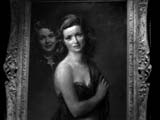 Portrait Painting of a Woman in the Window - With an Additional Reflection 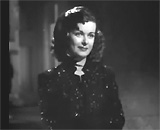 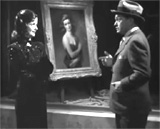 Painting Model Alice Reed (Joan Bennett) 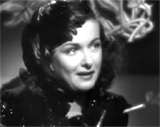 At a Late-Nite Club For a Drink 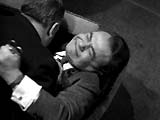 The Stabbing of "Frank Howard" -- Claude Mazard (Arthur Loft) 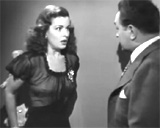 Alice and Wanley Covering Up the Crime 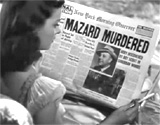 "Mazard Murdered" 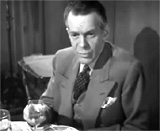 District Attorney Frank Lalor (Raymond Massey) 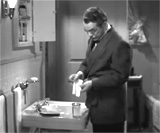 Wanley Preparing to Commit Suicide With an Overdose of Sleeping Powder 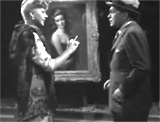 Female Passerby to Wanley: "Will you give me a light?" |
||||||||||||||||||||||||||